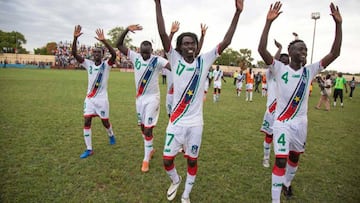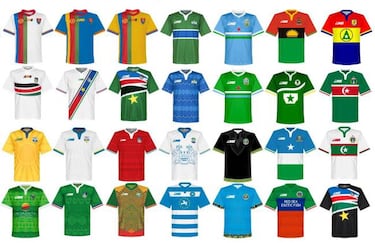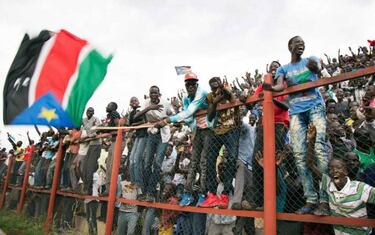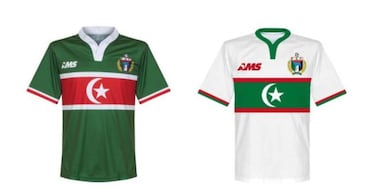From Melbourne to South Sudan, the 23-year-old kitting out African national teams
Luke Westcott founded AMS four years ago after finding a niche selling obscure football shirts online and is collaborating with numerous African football federations.


Eagle eyed lovers of African football currently following the continent's oldest soccer tournament, the East Africa-based CECAFA Cup, may have noticed that two of the participating nations (South Sudan and Zanzibar) are not wearing the usual ubiquitous global brands but are sporting kits bearing the AMS logo.
Having recently discovered the wonderful, colourfully vibrant shirts that form part of the AMS portfolio with the Melbourne-based company supplying the national teams of Rwanda, Sierra Leoene and Djibouti, as well as a series of domestic South Sudanese domestic club sides, a very curious AS English caught up with owner Westcott and asked the question: How on earth does a 23-year-old from Australia end up supplying football kits for some of the continent's more underdeveloped nations?

How did AMS (African Manufacturing Solutions) come about?
Luke Westcott: "I initially started selling imported Chinese made soccer shirts locally in Melbourne and then via eBay and started to get requests for these obscure African national teams where it was virtually impossible to get hold of replica kit. I soon realised that there was a significant global interest for shirts from these countries, with very few brands really commercialising their sale. I identified three nations and offered to sponsor their kit as a test run. Things worked out well and showed that opportunities could exist in many of the lesser developed African nations which are often overlooked by established international brands."
There seems to be a defined focus on South Sudan. How did you go about establishing a professional relationship with a football federation some 12,000km away?
"I contacted the president of the FA via Facebook and just told him we'd like to send through some kit that we'd designed and manufactured for the team, which they eventually started to wear in competitive games. For a period there was no actual deal in place and we'd just send through kit for them to use but now we have an official contract with the federation and have just started to sell replica shirts in the capital, Juba.

After travelling there, I realised just how much demand there was in the local market with zero supply for local or any African national team shirts, and the very few that were available were prohibitively priced replicas at $100 or so... well beyond the means of the bulk of the average fan. We try and ensure that our shirts are priced to cater for the budget of the local market but also aim for a price-point that deters piracy at the same time".
"South Sudan is presently somewhat of a test market and we feel that every possible obstacle that comes our way in South Sudan will equip us to deal with any hurdles that we're faced with as we look to establish ourselves in other African markets. We're now used to and happy to work with the numerous daily challenges that business there throws up but so far our model has been successful in South Sudan."
Puma have been highly visible for some years now in African football, how do you see their track record there and is their profile in Africa something of an aspiration for AMS?
"Some of the work, and especially designs where local African creatives have been involved in the design process for shirts that Puma have created over the years, has been excellent, but I feel they have failed to break through into smaller markets and in major markets sold official shirts at prices that were simply beyond the means of the average football fan. They have also tended to solely focus on the bigger African markets and overlook smaller countries."
There is a great degree of originality with many of the AMS shirt designs; is there a creative team involved in the process and to what point do the local federations get involved?
"I do the bulk of the design work myself but also get input from other creatives before a commercial release. We submit proposals to the federations and there is the usual back-and-forth procedure before we get the definitive concept. We always look for elements in the design that are culturally relevant."
#FootballForPeaceSouthSudan
— AMS Clothing (@amsclothing1) July 19, 2016
FIFA President Gianni Infantino proudly wearing his South Sudan jersey! pic.twitter.com/Xxjrg00wMR
Now that AMS has a presence, do you get approached by clubs or federations looking for collaborations?
"We now do get federations approaching us looking for terms and conditions and we're studying proposals with some of the national non-FIFA Pacific Island federations to allow them to get much needed funding via kit sales.
"We work with a number of federations linked with the Confederation of Independent Football Associations (ConIFA), which represents stateless peoples and regions unaffiliated with FIFA. This organisation is growing steadily and next summer the UK will host the ConIFA 2018 World Cup, which should generate a significant amount of media coverage."
6⃣ Points
— MichaelMwebe (@MichaelMwebe) December 7, 2017
5⃣ Goals scored
2⃣ Matches
Onwards and upwards for Zanzibar! pic.twitter.com/aGg4quoKc4
Where do the bulk of the AMS shirt sales come from?
"Via the website the main markets are definitely the US and Western Europe, with the bulk of the buyers being non-Africans. We're still looking at the best way to tap into the diaspora African market but currently via the site, I'd say it's 95% non-Africans. But it's great to see the interest from so many who like the designs or support the concept."

Have you encountered any hostility on a political level with your involvement with the disputed territory of Western Sahara?
Related stories
"There was some flak on social media after the Western Sahara deal but we try and avoid political issues even though in Africa that's sometimes easier said than done. Our attention is always to support football and if fans have a team that represents a group of people then our aim is to provide a culturally aware kit that they can be proud of."
To discover more about AMS, visit the official website